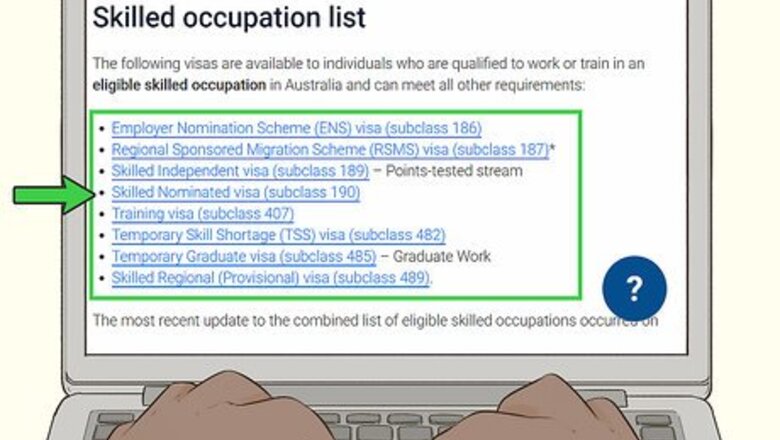
views
Determining Your Eligibility
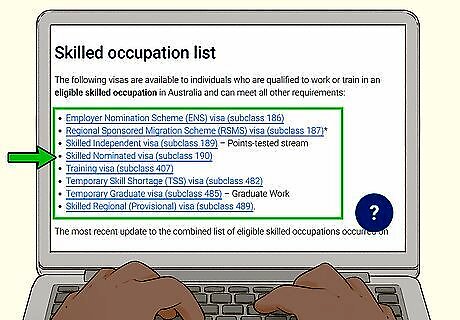
Work in a role from the list of eligible skilled occupations. In most instances, you'll only be granted a full working visa in Australia if you're working in an eligible field. Look over the Australia Government’s list of eligible skilled occupations to see if your chosen profession is listed. Even if your exact job title or field isn’t listed, there may be one that uses similar skills which you could switch into. Take a look through the list to see if any of the occupations fit with your working history. If your job isn't on the list of eligible skilled occupations, you won't be able to apply for a working visa in Australia through traditional means. Use the Australian Department of Home Affairs website to look into other visas you may be able to apply for. You can explore visa options here: https://immi.homeaffairs.gov.au/visas/getting-a-visa/visa-finder Eligible skilled occupations include many roles, such as bakers, butchers, copywriters, and helicopter pilots. If your profession requires some specialist training, it's likely it will be included.

Have your skills assessed by the relevant authority. In order to prove that you have the right skills for your chosen job, you'll need to contact the relevant Australian authority and have your skills assessed. Look at the “Assessing Authority” column in the list of eligible skilled occupations, and look online to find out how to contact them. Each assessing authority has their own rules, regulations, guidelines, and timelines for completing a skills assessment, as well as different contact methods. Look online for the assessing authority you need to get in touch with to find their contact details and get more information. If you're a medical practitioner, barrister, or solicitor, you'll need to be legally allowed to practice your profession in your chosen Australia state before you can apply.
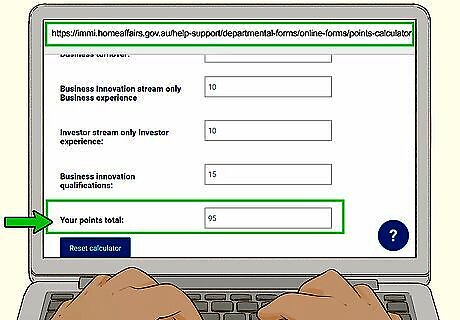
Make sure that you have more than 65 points of eligibility. Australia has a points system which allows you to quickly work out if you're eligible to live and work there. Use the Australian Immigration “points table” in order to find out how many points of eligibility you have. In order to apply for a working visa, you'll need more than 65 points. The points table from the Australian Department of Home Affairs can be found here: https://immi.homeaffairs.gov.au/help-support/departmental-forms/online-forms/points-calculator You will need to prove all of the claims made in your points evaluation when you complete your Expression of Interest. Points are granted based on a variety of factors, including your age, your English competency, qualifications, and experience in your chosen field. The more desirable you are as a member of Australian society, the more points you will have. For example, you'll be granted more points for a Ph.D. than a high school diploma. If you do not have 65 points, you aren’t eligible for an Australian working visa. Continue upskilling in your chosen field until you have enough points to be eligible.
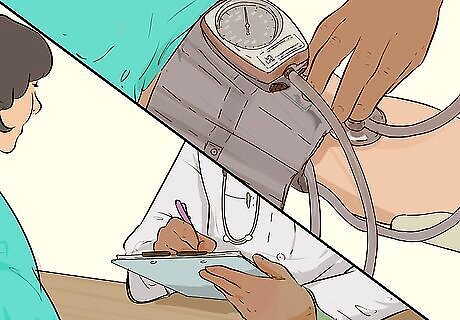
Get the required health exams. Most applications will require that you can prove you won’t be a health risk to the Australian government or public. Talk to your doctor about getting a full examination and a certificate that proves you are eligible to immigrate to Australia. Your doctor will know which tests they need to run in order to prove that you pass the health requirements. Your health requirements will be evaluated on a case-by-case basis by a Medical Officer of the Commonwealth. As such, there’s no checklist of conditions and diseases which will prevent you from being granted a visa. Your family members may also have to meet this health requirement, even if they're not immigrating to Australia with you.
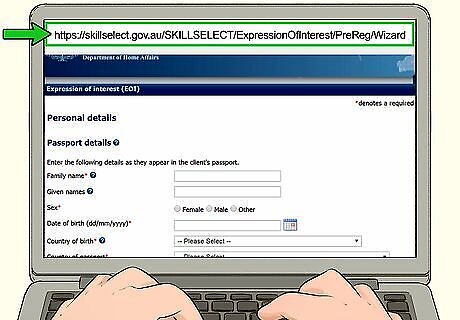
Submit an Expression of Interest form online. The Expression of Interest (EOI) is a free form that indicates to the Australian Government that you are looking to immigrate to Australia. It's not a visa application but may allow you to find someone willing to sponsor your application. Follow the instructions on the Expression of Interest form through the Skillselect portal. Make sure everything you write in the EOI is true and provable, or else you may not be able to apply for an Australian working visa for up to 10 years. You may be able to skip this step if there is an employer in Australia who wants to sponsor your application, with the understanding that they will employ you when your visa is approved. This is a Direct Entry steam visa, which has a slightly different process to this visa application. For more information, see here: https://immi.homeaffairs.gov.au/visas/getting-a-visa/visa-listing/employer-nomination-scheme-186/direct-entry-stream#Overview

Wait to receive an invitation to apply. Once you've submitted your Expression of Interest, you'll need to wait for an invitation to apply for a visa from Skillselect. It can take up to 2 years for your EOI to be processed, so you should continue working and upskilling in your chosen field to increase your chances. It can often take several months for your EOI to be responded to. Make sure you update the form as your circumstances change or improve so that it remains accurate when it is considered. If you receive an invitation to apply for a visa, you will have to do so within 60 days. It may help to begin organizing all of the required paperwork and evidence needed for your visa application before you receive this invitation. The invitation isn't a guarantee that you'll be granted a visa. There'll be specific eligibility criteria that you need to prove in your visa application before it is approved.
Gathering the Required Documents
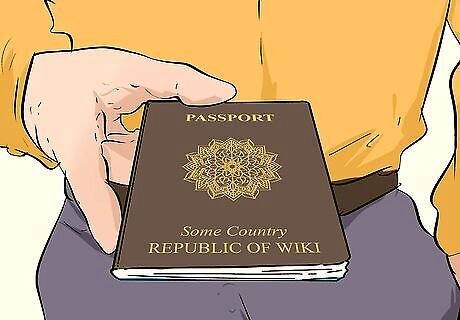
Get a valid passport from your country of origin. You'll need a valid passport to identify yourself when applying for a visa. Contact the relevant government department of your country to get a valid passport that proves that you are who you say you are. Renewing a passport can often take several months, so you should make sure it's up to date and valid before you receive an invitation to apply for an Australian working visa. The process of applying for a passport will vary between different countries around the world. Look online for more information specific to your country.
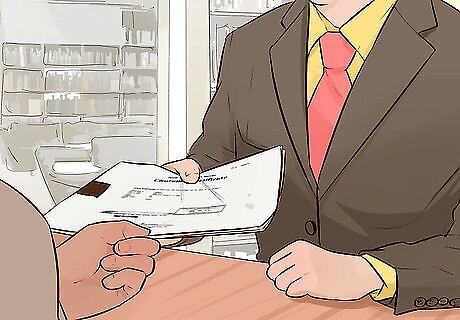
Collect a police certificate detailing any criminal history. If you have a criminal background, you likely won't be allowed to immigrate to Australia. As such, you'll need to provide a police certificate from every country where you've spent more than 12 months in the last 10 years. Contact the police departments for each of these countries and follow their process to get this character document. If you have served in the military of any country, you'll need to provide service records and discharge paper as well as the police certificates. If you're under 26 years of age, you only need to supply a police certificate from every country you've lived in since you turned 16. You'll need to use these documents to complete and prove the validity of Form 80 and Form 1220. Form 80 can be found here: https://immi.homeaffairs.gov.au/form-listing/forms/80.pdf. Form 1220 can be found here: https://immi.homeaffairs.gov.au/form-listing/forms/1221.pdf

Pass an English competency test. In order to prove that you are a competent speaker of the English language, you'll provide proof that you've passed an approved English language test. Information on several of these tests can be found here: https://immi.homeaffairs.gov.au/help-support/meeting-our-requirements/english-language/competent-english. Choose one of the tests, book an appointment to complete it, and reach the required score to assist in your application. If you're a citizen of the United Kingdom, the USA, New Zealand, or the Republic of Ireland, you can use a valid passport from your country as proof of English competency. The test results will only be valid for 3 years. After 3 years, you'll need to retake a test in order to prove your competency.
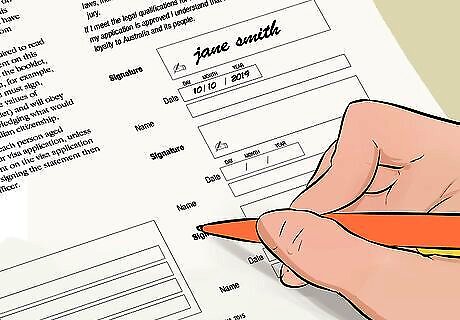
Sign the Australian values statement. As you'll be living and working in Australia, you're required to have an understanding of Australian values and principles. Read through the Australian values statement and make sure you're prepared to sign it if your visa application is approved. The Australian values statement can be found here: https://immi.homeaffairs.gov.au/help-support/meeting-our-requirements/australian-values The Australian government has put together a book that discusses and describes life in Australia.

Gather character, identify, and English competency documents for your spouse. If you're moving to Australia with your spouse or significant other, you'll need to gather all of the same documents for them. Talk to your spouse and help them collect character documents from the police, an English competency test, a valid passport, and a copy of your marriage certificate. If you are in a de facto relationship with a partner, you will need to register your relationship with an Australian State or Territory, or be able to prove you have been in a de facto relationship for at least 12 months. Get in contact with the Department of Births, Deaths, and Marriages to find out how to register a relationship in your chosen Australian state.

Collect identity documents for any dependents moving with you. If you have children or dependents moving with you to Australia, you'll need to collect documents for them as well. Make sure you have a valid passport for each of your dependents, as well as character documents from the police if they are over 16. If your dependent is over 18, they'll also need to complete an English competency test. You also need to prove that your dependents are dependent on you. For a dependent under 18, complete form 1229, which can be found here: https://immi.homeaffairs.gov.au/form-listing/forms/1229.pdf For a dependent over 18 years of age, you'll need to complete form 47A, which can be found here: https://immi.homeaffairs.gov.au/form-listing/forms/47a.pdf You also need to prove that dependents over 18 years of age are dependent on you. This proof could include proof that they live with you, their tax documents, or proof that they are currently studying.
Applying for the Visa
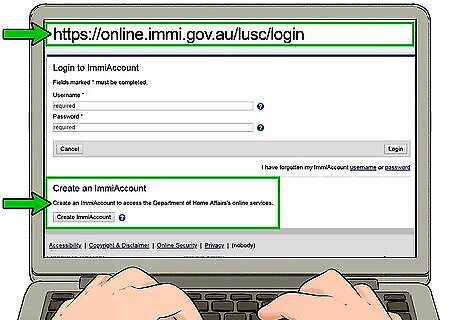
Create an ImmiAccount through Skillselect. Once your EOI has been accepted and you're invited to apply for a visa, you’ll be able to create an ImmiAccount. Log into your Skillselect account and click on the “Apply for visa” button to create an account. ImmiAccount will handle the actual application process for your visa. The login page for ImmiAccount can be found here: https://online.immi.gov.au/lusc/login Your ImmiAccount password and login won't be the same as your Skillselect account. You'll need to create a new login and password for ImmiAccount. You'll only be able to create an ImmiAccount once you have been invited to apply for a visa.
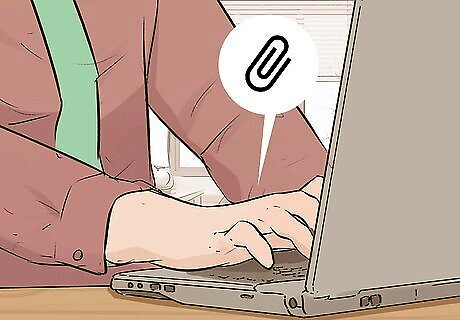
Fill out the application form and attach any documents. Log into your ImmiAccount and select the “New Application” button to begin your application. Answer any questions that appear in your application and begin attaching all of the documents required for your application. You will need to attach all of the documents and evidence you have collected, including copies of you and your family's passports, English competency tests, police certificates, medical certificates, and anything else you have used in the application to this point. Any other information required should be easily accessible, such as your name and contact information. Check your ImmiAccount often to see if any “Actions required” appear. These will tell you what you're missing from your application. Fix this as soon as you can. If anything changes with your application or your life status, update it immediately. This includes a change of address, e-mail address, passport details, or a change in your situation.
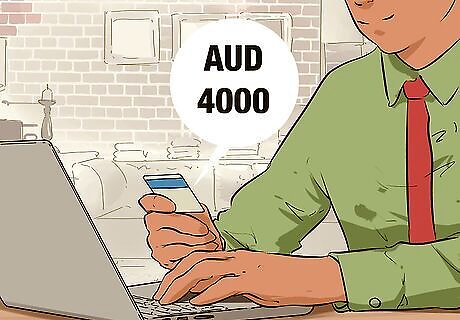
Pay the application fee. Use your credit card, PayPal, Union Pay, or B Pay account to pay the fee as soon as you can, as this is the last step before your application is submitted. The fees for a working visa in Australia start at around $4000 Australian dollars, which is roughly $2900 USD. Depending on your status, the number of dependents you have, and a variety of other factors, the fee associated with your application will change. If you receive another invoice for a second installment, security, or a bond, you should pay it as soon as possible. The application charge won't be refunded if your application is refused, so make sure everything is completely accurate.
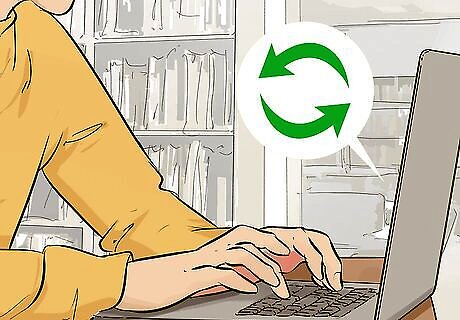
Check your ImmiAccount regularly until your visa is approved. It can take several months for your application to be completely processed. Check online regularly to see if there's anything you have missed, or where your application is in the process. If your visa is approved, you will be given a visa grant number and a date when your visa begins, after which you'll be able to work in Australia! If your visa is rejected, you will get an explanation for the reason why it was refused, as well as an update on whether or not you can contest this refusal.
















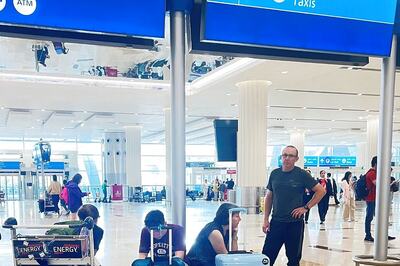
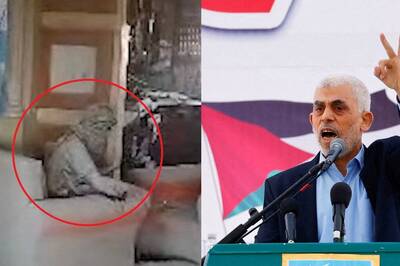

Comments
0 comment